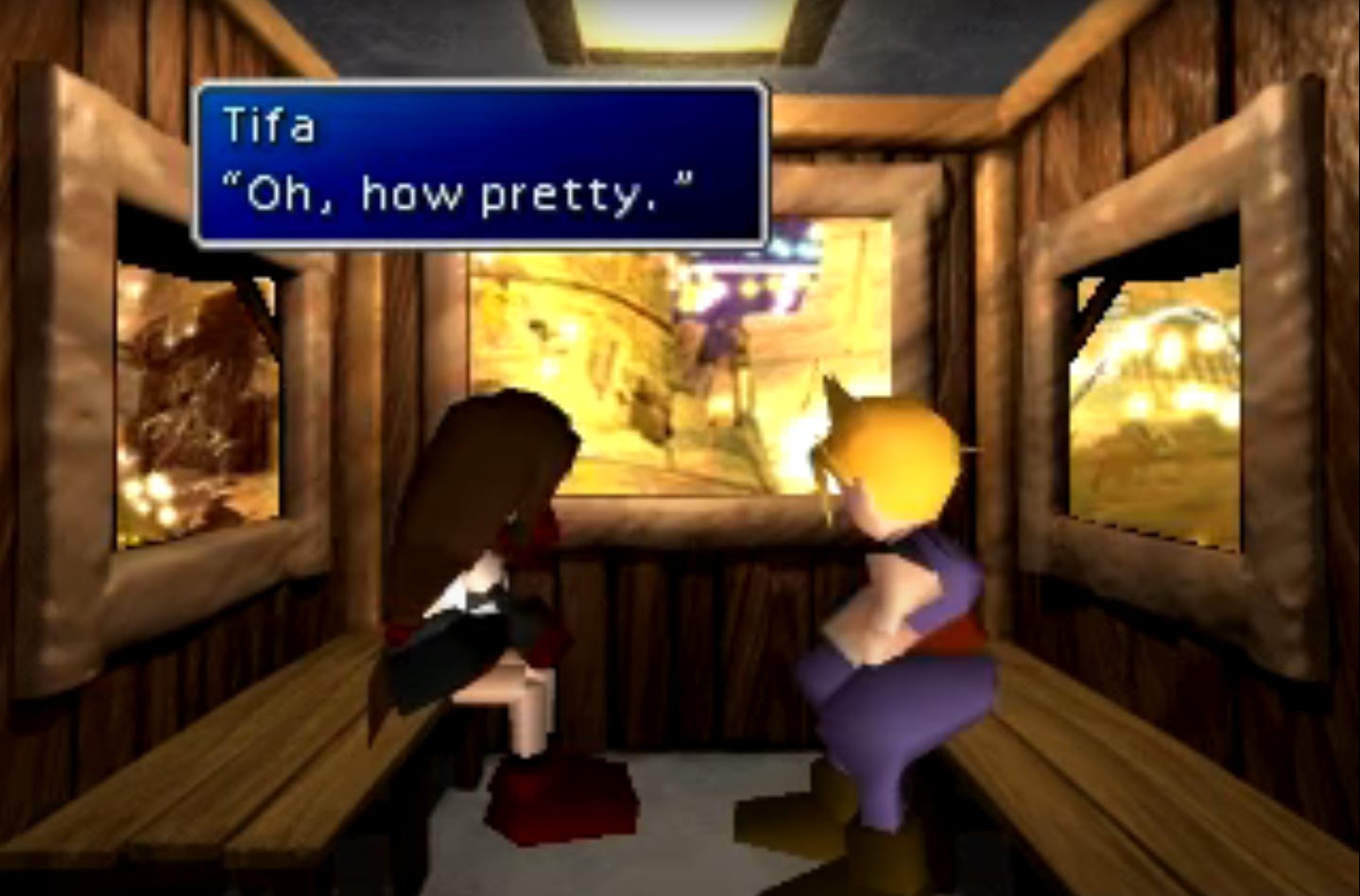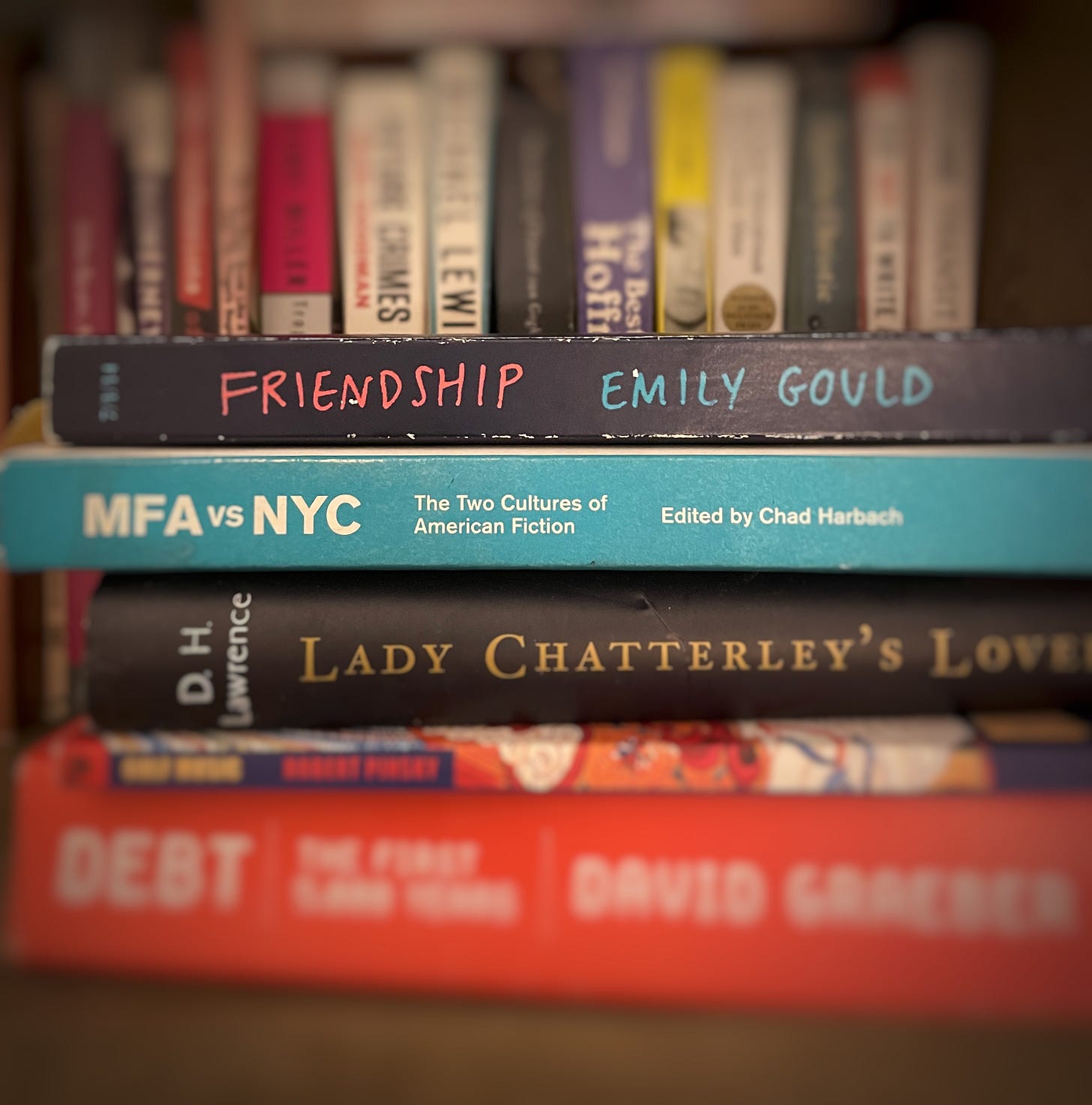First Dates and Fires That Burn Twice As Brightly
Men paying on first dates and Emily Gould's writings
Happy belated Valentine’s Day. I hope everyone had as eventful/non-eventful a day as they wished. Though the day is now firmly lodged in 2024’s memory, I still want to take its passing as a chance to talk about some recently published pieces.
The first, from The New York Times, is about how Gen Z is negotiating the question of whether the man should pay on the first date. So we’re still on this Riemann hypothesis of a conundrum. I’m not so much interested in the answer so much as the rationales that lead to the answer (the man should pay). The article author writes about how he goes on a Hinge date—as an assignment?—and asks his date about which gender should pay, to which she answers the man should because:
Women earn less than men
Women spend more time getting ready on outings than men
Women spend more on reproductive care than men
Interestingly, the author reports they end up splitting the bill anyway (did the date go terribly?). Still, his date’s reasons are worth delving into. The first reason seems sensible enough, regardless of where you stand on the causes of gender pay gaps. But why stop at gender? Certain racial groups make more than others, as do certain occupations. If the question of who pays on the first date is one of socio-economic disparities, why should gender—and specifically, gender in the context of heterosexual romance—be the only category that counts?
The second reason is frequently undercut by some women that say they don’t pursue beauty for men’s sake, but rather, either for themselves or for other women. If that’s the case, why should women’s expenditure on their personal appearance be relevant here? It would make as much sense as a man claiming a woman should pay for first dates because of his sports gambling losses.
The last reason regarding reproductive care has the most merit, though it edges on presupposing that the woman will have sex with the man. If she definitely knows she’s not attracted to him on that first date, does his obligation to pay disappear? I’ve also read arguments that since women are more likely to either temporarily or permanently drop out of the workforce when they have children, men ought to preemptively bear some fraction of that cost by footing the comparatively meager bill of a cocktail or a meal. But that assumes that all women will/should have children.
Is it so hard to just agree that in most cases, men should pay on the first date because it makes women feel good? In most cases, the man will do the asking and will get to plan the details of the first date, so he can set his budget. I remember once seeing a TikTok about a guy who took a first date out to Carbone’s in NYC for a very expensive dinner, after which she didn’t agree to a second date. Many accused her of using him for an extravagant meal, but he chose the place! At least I’m assuming that. If he let her bully him into going to Carbone’s, he’s got other issues to work on.
Back to the NYT article, the reasons the woman gave there aren’t ridiculous, though she left out the most obvious one, which is that in terms of physical risk, women clearly bear the greater burden in a first date than men do. So if men paying on the first date is a financial way to at least partially acknowledge and appreciate that risk, then who can really argue against that?
But still, this is all just post-hoc rationalization for the fact that there are some established gender roles we like and want to protect from cold unsexy social progressivism (one ghastly part of the NYT piece talks about a couple that uses Splitwise). We want the fairy tale, but we feel bad for wanting it, so we concoct face-saving reasons to morally justify that desire, which just ends up making everyone madder or at least more confused.
I’m not plugged into daily Twitter drama anymore, so I mainly know something has happened there if it makes its way onto Substack. So I learned about the existence of that Emily Gould divorce essay through
’s piece, which was a much more pleasant method of discovery than reading hysterical quote-tweet wars among 30-something teenagers.I wasn’t online enough in Gould’s heyday to have a strong opinion about her. Nor do I have much to say about her divorce piece, other than two writers should never get married. But I do want to talk about an essay of hers, Into the Woods, that I’ve always appreciated. It’s from MFA vs. NYC (and also available online, albeit behind a paywall), in which she writes about the financial difficulties she’s faced as a writer, even as a well-known one with multiple book deals. I’m guessing when she was at the height of her Gawker days, she had legions of seethingly envious haters who wished they were her and dreaded how she would continue ascending in linear fashion until she took over everything. But she didn’t, and by 2014 when this essay was published, Gould was already describing herself as one whose career peaked in her mid-twenties.
In the big scheme of things, a $200,000 advance for a book isn’t life-changing money, even in 2008 inflation-adjusted terms (a typical useless first-year big law associate makes almost as much as that now). It's hard to read how she spent $1,700 a month on rent for a number of years while not having a steady income, her future depending on landing an even bigger book deal the next time around. There’s a certain kind of romanticism in that kind of bold optimism that the more prudent-minded openly disapprove of but also secretly wish they themselves could experience. I’ve always been sensible with money and paranoid about lifestyle creep. But as I’ve gotten older, I’ve also started to wonder about what it might’ve been like if I had splurged on that apartment, if only for a year or two, and that even if I were to do it now, it wouldn’t be the same. Money spent now is not the same as money spent in the past or the future.
How many books do even great writers have in them? For all the risk, effort, and emotional investment you put into a book, a nice one-time equivalent of an upper-middle-class salary is a pitiful return. And your book better earn that advance back too or you’re done for.
It took me a while to realize that my book had failed. No one ever told me point-blank that it had. It was more like the failure occurred in tiny increments over the course of two years, after which it was too late to develop a Plan B.
The above quote from Gould’s essay has stuck with me. We like to imagine our potential failures to be spectacular and mortifying, but chances are, most of the time, they’ll be dreadfully mundane. The calendar quietly passes by a certain date you should’ve heard back by. A party goes on like normal as it dawns on you that the person you hoped to see there is not coming. You accomplish something you thought was monumental, only for the next mornings to feel just as they did before.
Several years ago, I came across Gould’s novel, Friendship, on a used book rack at a bookstore (I forget if it was in Philly or NYC). It actually has her autograph in it, to someone named Jaime. It was a perfectly fine read, though I wouldn’t say it was a good or memorable book. Two women in creative-ish careers who are having to deal with the fact that what was cute in their 20s is now become arrested development in their 30s. I mostly remember how one of the protagonist’s storylines resembled that of Hannah (from Girls) in that she’s a Midwestern NYC transplant who’s a writer and ends up getting pregnant from a one night stand.
Lena Dunham is actually mentioned in Into the Woods, where Gould observes bittersweetly how she herself had actually once said Hannah’s immortal line about being a voice of a generation, and how in another life, she could’ve been Dunham with a successful TV show. The sobering fact is, of course, that Dunham also had a huge fall from grace and only now seems to be receiving a sympathetic retrospective, now that she’s older and no longer a cultural threat.




I found your substack after your most recent appearance on the Champagne Sharks podcast and I just wanted to say I appreciate what you write about so much. I’m a 27 year old straight dude struggling with dating in a big city and your writing makes me feel not crazy and not alone. I’ve accepted women and queer men don’t care all that much about men’s dating woes, but it’s always surprised me how many straight men performatively “don’t care” either. Thank you for caring and having compassion about it.
I had about five years of my life when I was living off book advances too large to ever come again (my first book sold for $100,000 and my last book sold for $9,000). It was kinda great. How many people just get to do nothing for five years? Of course I never had to pay the piper--I'm 37 years old now and own a home and send my kid to private school. But it seems like Gould has a reasonable middle-class lifestyle these days too. Even F. Scott had good years and bad years--when he was churning out screen plays for money, I bet he wished he'd banked a few of those $2000 Saturday Evening Post paychecks (equivalent to thirty thousand dollars today!) But c'est la vie. What's the fun of being a writer if you've gotta treat it like an ordinary job.
When I was a man, I always paid for dinner, because I knew some women expected you to. Same as how I tip a bartender but not a hot-dog vendor: it's all just social convention.